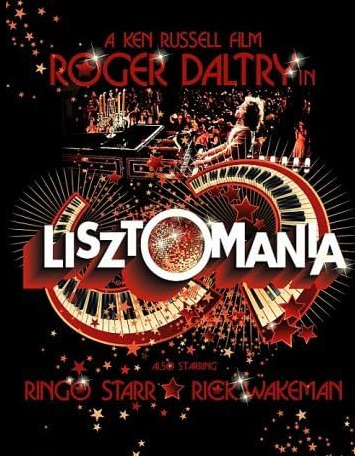Lisztomania, another delirious musical film by Ken Russell / Lisztomania, otro delirante film musical de Ken Russell [English/ Spanish].

Lisztomania is a film that was directed by Ken Russell and released in 1975. It is a musical fantasy that explores the life of the famous composer and pianist Franz Liszt, played by Roger Daltrey, famous for being the lead singer of the band The Who. The plot centers on Liszt's relationship with Countess Marie D'Agoult, played by actress Fiona Lewis, as well as his rivalry with composer Richard Wagner.
This film is a unique and extravagant depiction of Franz Liszt's life. Ken Russell, known for his striking and provocative visual style, succeeds in capturing the exuberance and passion surrounding the figure of Liszt, as well as his controversial relationship with Marie D'Agoult. The film also addresses issues such as fame, fan adoration and the influence of music on society.
Franz Liszt (Roger Daltrey) is arguably a rock star (he has fans, scandals and groupies). It begins when, after a recital, he receives an invitation from Princess Caroline of St. Petersburg (Kestelman), and begins a relationship with her, leaving behind his mistress Marie d'Agoult and her children. Once the pope (Starr) prevents the new marriage, Liszt becomes abbot, and receives a mission: to exorcise his friend and husband of his daughter Cosima, Richard Wagner (Paul Nicholas).
This film reaches its best moments precisely in the analogy to the media excesses of a society that begins to erect an idol out of music. Ken Russell takes advantage of this strange and questionable radiography to also address the physical and mental degradation surrounding this figure (a clear allusion to the rockstar movement of the seventies).
Lisztomania has been praised for the originality and audacity of the film, as well as for the performances of the main actors. However, others criticize Ken Russell's excessive flamboyance and sensationalist approach to Liszt's story. In addition, the portrayal of historical figures such as Wagner and Liszt has been the subject of debate, as it departs from historical reality in favor of a fanciful and theatrical approach.
The film overwhelms at times by showing the struggle between good and evil, classical music and rock, the rise of Nazism and its contamination in music, all spiced with countless sexual fantasies. Here, the images are exacerbated, the facts are exaggerated, the approaches are extreme, the colors in the story are enlivened and the music intensified. There is even a tribute to Charles Chaplin.
The adaptations of Liszt's and Wagner's music were done by Rick Wakeman (keyboardist for the band Yes), which is illustrative of the film's tone. Wagner makes a mechanical Viking named Siegfried with the intention of ridding the country of Jews, the pope is Ringo Starr, there is a zombie (the reincarnation of Wagner) and a rocket (where Liszt flees). These are quirky elements in an already crazy, fast-paced story. Interestingly, Lisztomania was the first film to be shown in Dolby Stereo.
Roger Daltry does an excellent job playing Franz Liszt, capturing both his musical genius and charismatic personality. Fiona Lewis also excels in her role as the passionate and conflicted Countess Marie D'Agoult. In addition, the presence of guest stars such as Ringo Starr, playing the Pope, and Rick Wakeman, playing Siegfried, (who looks a lot like Thor), add an additional element of entertainment to the film.
If we get into its game, Liztomania is a film that amuses and entertains, but it also raises criticisms towards the figure of Liszt, the representation of him as a mass idol who awakens a kind of fanatical madness among his followers is an interesting metaphor about the power and influence of music in society.

Lisztomania es una película que fue dirigida por Ken Russell y estrenada en 1975. Es una fantasía musical que explora la vida del famoso compositor y pianista Franz Liszt, interpretado por Roger Daltrey, famoso por ser el vocalista de la banda The Who. La trama se centra en la relación de Liszt con la condesa Marie D'Agoult, interpretada por la actriz Fiona Lewis, así como su rivalidad con el compositor Richard Wagner.
Este film es una representación única y extravagante de la vida de Franz Liszt. Ken Russell, conocido por su estilo visual llamativo y provocador, logra capturar la exuberancia y la pasión que rodean la figura de Liszt, así como su controvertida relación con Marie D'Agoult. La película también aborda temas como la fama, la adoración de los fans y la influencia de la música en la sociedad.
Puede decirse que Franz Liszt (Roger Daltrey) es una estrella de rock (tiene fanáticos, escándalos y groupies). Comienza cuando, tras un recital, recibe la invitación de la princesa Caroline de San Petersburgo (Kestelman), e inicia una relación con la misma, dejando atrás a su amante Marie d'Agoult y a sus hijos. Una vez que el papa (Starr) impide el nuevo matrimonio, Liszt se convierte en abad, y recibe una misión: exorcizar a su amigo y esposo de su hija Cosima, Richard Wagner ( Paul Nicholas).
Este film alcanza sus mejores momentos precisamente en la analogía a los excesos mediáticos de una sociedad que comienza a erigir a un ídolo salido de la música. Ken Russell aprovecha esta extraña y cuestionable radiografía para abordar también la degradación física, y mental en torno a esta figura (clara alusión al movimiento de los rockstars setenteros).
Lisztomania ha sido elogiada por la originalidad y la audacia de la película, así como por las actuaciones de los actores principales. Sin embargo, otros critican la excesiva extravagancia y el enfoque sensacionalista de Ken Russell en la historia de Liszt. Además, la representación de figuras históricas como Wagner y Liszt ha sido objeto de debate, ya que se aleja de la realidad histórica en favor de un enfoque fantasioso y teatral.
La pelicula abruma por momentos al mostrar la lucha entre el bien y el mal, la música clásica y el rock, el surgimiento del nazismo y su contaminación en la música, todo ello condimentado con innumerables fantasías sexuales. Aqui, se exacerban las imágenes, se exageran los hechos, se extreman los enfoques, avivando los colores en la historia e intensificando la música. Incluso hay un homenaje a Charles Chaplin.
Las adaptaciones de la música de Liszt y de Wagner corrieron por cuenta de Rick Wakeman (tecladista del grupo Yes), lo que es ilustrativo del tono del film. Wagner fabrica un vikingo mecánico llamado Siegfried con la intención de librar al país de los judíos, el papa es Ringo Starr, hay un zombie (la reencarnación de Wagner) y un cohete (donde huye Liszt). Estos son elementos estrafalarios en una historia de por sí muy loca y acelerada. Curiosamente, Lisztomanía fue el primer film que se exhibió con el sistema Dolby Stereo.
Roger Daltry hace un excelente trabajo interpretando a Franz Liszt, capturando tanto su genialidad musical como su personalidad carismática. Fiona Lewis también destaca en su papel de la apasionada y conflictiva condesa Marie D'Agoult. Además, la presencia de estrellas invitadas como Ringo Starr, interpretando al Papa, y Rick Wakeman, interpretando a Siegfried, (el cual se parece mucho a Thor), añaden un elemento adicional de entretenimiento a la película.
Si entramos en su juego, Liztomania es una película que divierte y entretiene, pero también plantea críticas hacia la figura de Liszt, la representación de este como un ídolo de masas que despierta una especie de locura fanática entre sus seguidores es una metáfora interesante sobre el poder y la influencia de la música en la sociedad.
Lisztomania, fue un fracaso en taquilla que se convirtió es una película de culto al ser única y provocativa, con actuaciones dinámicas, su estilo visual atrevido y su narrativa fantasiosa, su director Ken Russell logra crear una experiencia cinematográfica fuera de lo común. A pesar de sus críticas, Lisztomania sigue siendo una obra notable en la filmografía de Ken Russell.
Gracias por pasar a leer mi blog, estoy deseoso de compartir mi opinión acerca de otros títulos cinematográficos musicales. Un gran saludo a todos.

El separador es de uso gratuito y ha sido proporcionado por @onexel, Enlace Aquí.
Esta es la fuente de la primera imagen Fuente
Las última imagen es de mi propiedad y pertenece a parte de mi colección de peliculas fueron tomadas con mi telefono celular Umidigi F2.